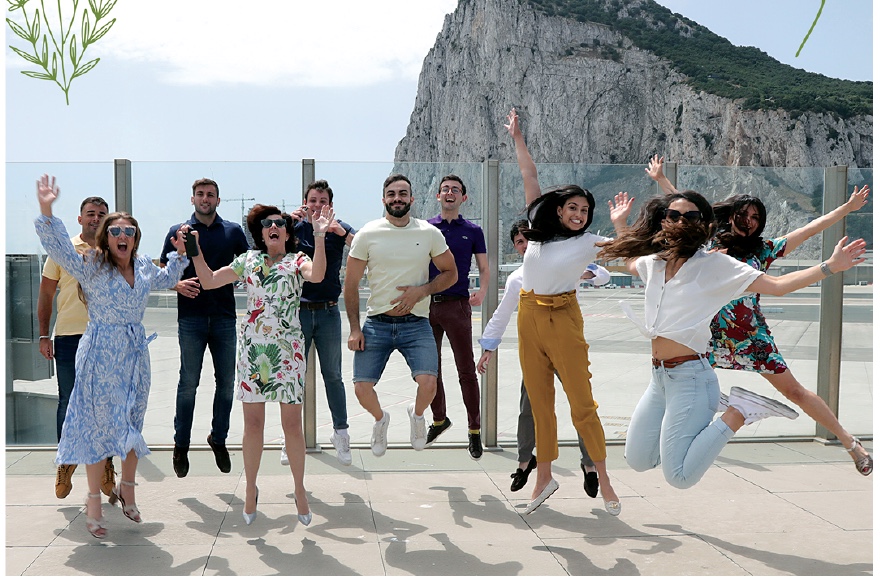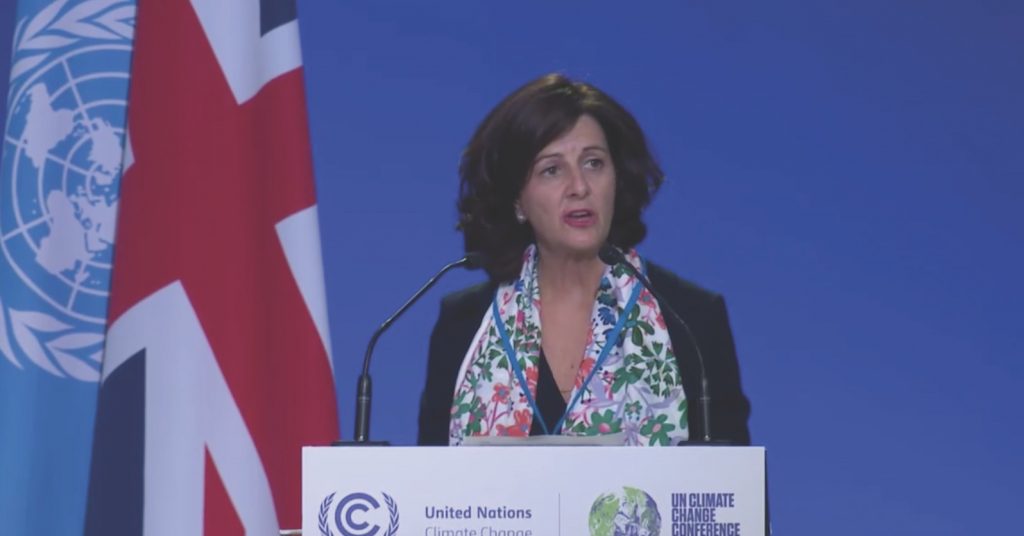Jo Ward talks to Professor Daniella Tilbury, Gibraltar’s first Commissioner for Sustainable Development and Future Generations.
Prof. Daniella Tilbury is a changemaker, educator and sustainable development leader who was the first woman in Gibraltar to hold the title of university professor and until 2018 she was the inaugural Vice-Chancellor and CEO of the University of Gibraltar.
What you may not know is that Daniella was instrumental in starting the global phenomenon that is Earth Hour, forming part of the World Wide Fund for Nature (WWF) Australia Board and team that created Earth Hour in Sydney in 2007. “Earth Hour started as something very small and not that ambitious,” she comments. “We stood on the shores of Sydney Harbour thinking that some of the lights may go off but we weren’t entirely sure and now, so many years later, it has become a global phenomenon with lights switching off all over the world at the end of March every year as a reminder of the importance of our reliance on the planet.”
Jo Ward talks to Professor Daniella Tilbury,
Gibraltar’s first Commissioner for Sustainable
Development and Future Generations.
Prof. Daniella Tilbury is a changemaker, educator and sustainable development leader who was the first woman in Gibraltar to hold the title of university professor and until 2018 she was the inaugural Vice-Chancellor and CEO of the University of Gibraltar.
What you may not know is that Daniella was instrumental in starting the global phenomenon that is Earth Hour, forming part of the World Wide Fund for Nature (WWF) Australia Board and team that created Earth Hour in Sydney in 2007. “Earth Hour started as something very small and not that ambitious,” she comments. “We stood on the shores of Sydney Harbour thinking that some of the lights may go off but we weren’t entirely sure and now, so many years later, it has become a global phenomenon with lights switching off all over the world at the end of March every year as a reminder of the importance of our reliance on the planet.”
‘Today 4 Tomorrow’
Daniella explains exactly what sustainable development is and why it is so important for the future of our planet. “There is a phrase I use that is ‘Today 4 Tomorrow’ and I think this phrase captures the spirit of sustainability,” she says. “Sustainability is like wearing a new set of glasses; the glasses help you see things very differently but above everything else they help you make a connection between what you do now and the future.”
Sustainability is often mistaken to be solely about environmental concerns but in fact although the environment has a lot to do with it, it is very much more than that. “It is about people and planet and definitely not about just waste, pollution or energy,” Prof. Tilbury states. “It is about a much bigger picture connecting with health, social justice and quality of life, conserving biodiversity, protecting our vulnerable in our community and being safe.”
It is true to say that Daniella is passionate about sustainability and that she has worked at various levels of engagement with this agenda throughout her career. “From Tanzania, Colombia and Madagascar where I worked in villages and towns on the ground, to working with agencies such as the police force in Asia trying to protect wildlife, environments and livelihoods and then to working at UN level, establishing treaties that protect the planet and going on to work in the areas of sustainability, such as climate change,” she explains.
Daniella was involved in international dialogues on climate change and was a delegate at the UN Climate Change Conferences held in Copenhagen (COP15) Marrakech (COP22) and Paris (COP21), Madrid (2019) and Glasgow (2021). She has also worked with corporate agencies, banks and financial institutions by ‘looking at ways in which they can make decisions that are better for people and planet’ Daniella explains.
Concern for the Future
With a wide range of experience in this area, Daniella says that her commitment is a concern for the future. “I am very passionate about the fact that we need a better future than the one that is currently facing us, and I almost feel that the future is running away from us and that it is going to be very different to what we are living through now.”
Prof. Tilbury cites changes in the way we work, eat, travel, generate electricity in our homes, and health care. “I don’t think there is an aspect of our lives that is not going to be touched by the future that is facing us.”
Negative Chaos
Agreeing that the world is in chaos at the moment, Daniella says that we need to take control and create an alternative future. “Climate change is going to bring such a different aspect to our lives,” she comments. “When you think about climate change you think about forests and fires but actually one of the biggest impacts is going to be the changing weather patterns of Gibraltar and a rise in sea levels, and we are surrounded by the sea.” She goes on to say that we have to be not just prepared for this but we have to understand that things will have to be organised in a very different way and that if we take control of it now, it will be much better for us in the future.
As part of her work as an academic leader in sustainable development, Daniella is credited with having developed the initial frameworks for education in this field. “One of the key things I do is work with how we bring about change – social, economic and community change – and I focus more at that level rather than individual change as the former can have a greater multiplier effect and help us get to where we need to be quicker.”
One of the key things, according to Prof. Tilbury, is understanding that change is not a linear process but that it is a bit like a game of snakes and ladders. “Snakes make things difficult and the ladders can accelerate the changes that we want to see, and whilst it is certainly not a game there are a lot of parallels with the reality of bringing about changes in our community.”
The COVID-19 pandemic has had an impact on all areas of our lives, including affecting sustainable development goals. Prof. Tilbury says that one of the key things it has highlighted is that we now realise how connected the world is. “It is important not to just think within your borders but to think beyond them and I think that the global pandemic alerted us to the importance of working together as an international community,” she states, going on to add that we will need to be doing that a lot more as we face some of the big wicked problems of the 21st century. “We really have to be connecting and building on our strengths and talents to solve these problems.”
Gibraltar and Radical Transformation
Prof. Tilbury explains what else can be done to effect this great radical transformation, particularly in Gibraltar. “We need to see things differently, not just to concern ourselves with decisions every day – but we need to see how our everyday decisions have an impact on the future, and my worry is that I don’t think we have a tradition of thinking ahead too much.”
Taking part in Gib Talks in 2016, Daniella spoke about ‘Creating a 2020 Vision for Gibraltar: Learning and Change’. “I spoke about the fact that maybe our colonial heritage has influenced the way we see the future and our confidence to get involved or plan ahead; we need to build future thinking capability and that commitment to be engaged as against to letting others do that for us.”
Sustainability could be at the heart of everything we do in Gibraltar. “It could become a key pillar in our decision making, and although we are a small place, we could have a lot of reach, impact and influence and show the world how it is done,” Prof. Tilbury comments.
Having worked in rural communities and agencies in Africa and Asia, in the corporate sector advising investment in Oceania and Europe, as well as with advising the European Commission and the UN on international agreements such as the Climate Change Paris Agreement, I ask Daniella how difficult it is to switch between policy and practice and which type of activity she prefers? “It is necessary for those in policy to be involved in practice – and vice versa – because there shouldn’t be a disconnection between legislating, planning, investing and doing, they need to come together, so it is not that difficult, but my preference is definitely working with young people.”
One of the initiatives Prof. Tilbury was involved in recently was The Futures Forward Academy, a leadership programme relevant to young people who wish to play a role in creating a sustainable future for Gibraltar. “I so much enjoyed working on this with them, connecting their current practice to the future of their professions,” she explains, adding that these very smart, very engaged young people that have their life time in front of them can see different possibilities to the ones that we are currently facing.
Education can bring about a fundamental shift in how we think and act and support the transition to a prosperous and sustainable future, however for Daniella it is much more than just changing those glasses that she mentioned above. “It is about building the ability in people to do something about it – so on one hand we get Greta’s (Greta Thunberg) generation that are very frustrated because they have high levels of awareness and they know about climate change and about things that are going ahead, but they want to make a difference and they don’t know how to because they haven’t been taught by their schools or communities about how to influence the way decisions are taken – so they protest on the streets.”
For Daniella education is not only about understanding the problem, but it is also about giving young people the capability to actually make that difference. “In fact it is not just about raising awareness anymore because that in itself can cause frustration, concern, and anxiety.”
“We need to give the ability to young people and to others to actually bring about those changes and that just doesn’t happen because you have commitment, it is really about understanding how change can happen.” Prof. Tilbury’s opinion is that it is not as simple as making the case to decision-makers to do something, everything has to align and there needs to be an expectation as well as the support from people across the community.
“There are a lot of changes that we can put into place now that will have a significant impact on our future,” she says.









